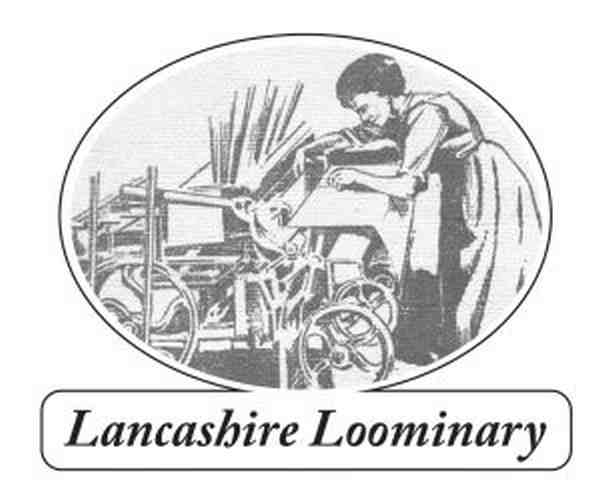The Lancashire Loominary
An occasional update from Lancashire Loominary : No. 6 September 2021
Lancashire’s Romantic Radical: new edition of Allen Clarke biography is out
The new and updated edition of my biography of Allen Clarke (Allen Clarke – Teddy Ashton: Lancashire’s Romantic Radical) is now available with a pre-publication offer. There is a lot of new material in it, including an entirely new chapter on Clarke’s railway writings. The official publication is September 1st but I am doing a pre-publication offer for £15, with free local delivery in the Bolton area, or add on £3 for UK postage (this will continue to the end of September). You can 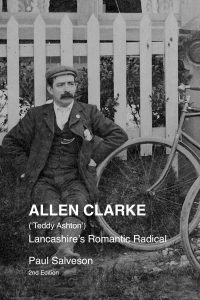 download an order form from my website, below, or there’s one at the back of this newsletter: http://lancashireloominary.co.uk/index.html/order-form
download an order form from my website, below, or there’s one at the back of this newsletter: http://lancashireloominary.co.uk/index.html/order-form
I’ve a number of talks planned for the Autumn for different groups, and still open to requests. The main Bolton launch event will be on Saturday September 25th at the Lecture Theatre of Bolton Central Library. It will start at 11.00 and end by about 12.30 with book signing (at the special rate of £15). No need to book, just turn up. There will be a Blackpool event at the town’s main library in October, details to be determined later.
Unlikely Pioneers
I’ve been working on a new edition of my ‘Whitman’ book – With Walt Whitman in Bolton – spirituality, sex and socialism in a Northern Mill town – last published in 2019 though little changed since 2009. I’ve combined it with a lengthy paper on Whitman’s influence on ‘Northern Socialism’ 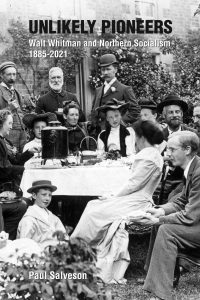 and re-titled it Unlikely Pioneers: Walt Whitman, the Bolton Boys and Northern Socialism. I’m going to publish it as a kindle book to keep costs down – but the print version which is just on the Bolton group (and nicely illustrated) is still available at the special price of £5 plus p&p.
and re-titled it Unlikely Pioneers: Walt Whitman, the Bolton Boys and Northern Socialism. I’m going to publish it as a kindle book to keep costs down – but the print version which is just on the Bolton group (and nicely illustrated) is still available at the special price of £5 plus p&p.
The latest Salvo
Here is a link to the latest Northern ‘Weekly’ Salvo number 295 – England and ‘Englishness’ (see below), reviews of books by some old mates, trips to Coniston and Ulverston, a literary walk on the moors and the new exhibition of ‘Railway Workers’ Art’ at the Platform 5 Gallery , Bolton. Plus the new RHS gardens at Worsley with comments about the lack of decent public transport access. It’s here: http://lancashireloominary.co.uk/index.html/northern-weekly-salvo-295
England, which England?
The quest for a ‘progressive English politics’ is something that seems to have captured the imagination of quite a few writers on the English left, mostly columnists for The Guardian and Observer. I could be accused of making cheap points that most of them are based in London, but I won’t. As Marx said, material reality (inc. where you live) determines your consciousness. There’s another school of thought, which I must confess to having leaned towards myself on some occasions, which is quite anti-English. It’s a view shared by some in the Northern Independence Party which hopes to wish away the reactionary English state and have a Northern socialist republic. It’s a lovely dream, perhaps, but political utopias usually turn into something very different from what their first disciples hoped for. And I don’t think many people really want it. You can be passionately ‘Yorkshire’ and still identify as English, as well as ‘Huddersfield’ etc.
It’s always a good idea to start with a concrete analysis of a concrete situation. Scotland is key to this, with the likelihood that it will break away from the UK within the next ten years, possibly sooner. Northern Ireland could become an even bigger hot potato within the same time frame, the North re-uniting with the South and rejoining the EU. That leaves a UK comprising England and Wales, with Wales very much the junior partner. Could it go its own way? People say that it’s too small but that doesn’t necessarily bear scrutiny. Far smaller nations have gone independent and done very well – Iceland being just one.
So there is the possibility that we end up with a centralised English state by default. That could be very bad for the North and possibly the Midlands too, as more power – political and economic – concentrates in London and the south-east. Throwing a few sops to the North in the form of a bit more power for the largely unaccountable mayors won’t make that much difference.
What could make for a much more attractive vision of a ‘new England’ is a political entity that is decentralised with a much smaller central state – and it doesn’t matter that much whether or not it’s in London (I’d keep it there). Strong regions, based on historic boundaries rather than ‘technocratic’ ones, should be the foundation – county regions such as Yorkshire and Lancashire – with empowered local government again based on historic identities where possible and of appropriate size, that is really ‘local’. That means a return of the old ‘Lancashire’, starting with Greater Manchester (Burnhamshire) rejoining what’s left.
That set-up could work whether or not Scotland, Wales and Northern Ireland went their own ways. It would be a sad thing if they did and I suspect that after a while there might be the basis for a rapprochement based on equality between the nations and regions, rather than the current overwhelming dominance of England, and London in particular. A British confederation.
So a new England is possible, and we get glimpses of it through things like the Euros and our great ambassadors in the England football team. Nobody has to hate England, particularly anyone who is English. There’s lots of things in our past that are positive, in politics, culture, sport and industry. We should cherish these but have the maturity to look at the negatives in an open and honest way too.
So I think it’s OK to love England, but accept that it needs to change – and discard the reactionary trappings of an old imperial state. Personally, I’m relaxed about the monarchy continuing but again, let’s drop some of the outdated nonsense that goes with it. It all comes back to the people, the demos, democracy. Our voting system is an embarrassment, our leaders are a joke. But change is possible. As the gay, upper-class Edward Carpenter (who made Yorkshire his home) once sang, ‘England Arise!’
Other books from th’same shed: Moorlands, Memories and Reflections
2020 was the centenary of the publication of Allen Clarke’s Moorlands and Memories, sub-titled ‘rambles and rides in the fair places of Steam-Engine Land’. It’s a lovely book, very readable and entertaining, even if he sometimes got his historical facts slightly wrong. It was set in the area which is now described as ‘The West Pennine Moors’ It also included some fascinating accounts of life in Bolton itself in the years between 1870 and the First World War, with accounts of the great engineers’ strike of 1887, the growth of the co-operative movement and the many characters whom Clarke knew as a boy or young man.
My book is a centenary tribute to Clarke’s classic – Moorlands, Memories and Reflections. It isn’t a ‘then and now’ sort of thing though I do make some historical comparisons, and speculate what Clarke would have thought of certain aspects of his beloved Lancashire today. There are 28 chapters, covering locations and subjects which Clarke wrote about in the original book, with a few additions. It includes the Winter Hill rights-of-way battle of 1896 and Darwen’s ‘freeing of the moors’; a few additional snippets about the Bolton ‘Whitmanites’, handloom-weaving, railway reminiscences, the remarkable story of ‘The Larks of Dean’ and Lancashire’s honourable tradition of supporting refugees (including the much-loved Pedro of Halliwell Road). The story of Lancashire children’s practical support for the locked-out quarryworkers of Snowdonia in 1900-3 is covered in some detail, including the remarkable ‘Teddy Ashton Picnic’ of 1901 in Barrowbridge, which attracted 10,000 people. It is well illustrated.
It is available for Loominaries reading this at £20, with £4 post and packing. Go to http://lancashireloominary.co.uk/index.html/order-form or use order form below
I can do free delivery locally (within 6 miles of Bolton).
The Works: a tale of love, lust, labour and locomotives
I’ve had a steady flow of orders for The Works, my novel set mostly in Horwich Loco Works in the 1970s and 1980s, but bringing the tale up to date and beyond – a fictional story of a workers’ occupation, Labour politics, a ‘people’s franchise’ and Chinese investment in UK rail. I’ve 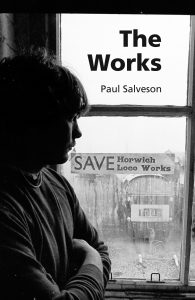 had lots of good reactions to it, with some people reading it in one session. The Morning Star hated it. If you want a copy I can offer it for £5 plus £2.50 postage to those of you on this mailing list. Please make cheques payable to ‘Paul Salveson’ and post to my Bolton address above or send the money by bank transfer (a/c Dr PS Salveson 23448954 sort code 53-61-07 and email me with your address). If you are local I can do free delivery by e-bike (so just a tenner). There is a kindle version available price £4.99 and you can also buy it off Amazon. See www.lancashireloominary.co.uk
had lots of good reactions to it, with some people reading it in one session. The Morning Star hated it. If you want a copy I can offer it for £5 plus £2.50 postage to those of you on this mailing list. Please make cheques payable to ‘Paul Salveson’ and post to my Bolton address above or send the money by bank transfer (a/c Dr PS Salveson 23448954 sort code 53-61-07 and email me with your address). If you are local I can do free delivery by e-bike (so just a tenner). There is a kindle version available price £4.99 and you can also buy it off Amazon. See www.lancashireloominary.co.uk
If you’ve already read and hopefully enjoyed The Works it would be great if you could do a short review of it on my facebook page (Lancashire Loominary). Feedback on how it could have been better is also welcome, especially as I’m starting work on the next novel (see below).
The Works is available in a range of outlets – please support them, and see www’lancashireloominary for details of their location, ranging from Bolton and Horwich to Carnforth, Barrowford, Machynlleth and Bo’ness.
If you know of any local shop which might like to take my books please let me know. I do a third discount, sale or return.
With Thomas Hardy in Dorset
Thanks to a conference in Bournemouth (the REPTA AGM) we were able to explore Dorset for a few days, making the most of our bus passes. There’s a surprisingly extensive bus network and I was impressed by the quality of the operators. Dorchester-based Damory was particularly good but also Yellow Buses and Morebus too. We naturally took the no. 50 from Bournemouth to Swanage via the the Studland ferry for a trip on the Swanage Railway, behind BR standard 2MT 78018. We caught the Damory-operated bus from Blandford Forum to Dorchester, alighting near to Bockhampton, where Thomas Hardy spent his childhood and youth. It’s owned by the National Trust, as is his later home at Max Gate, a pleasant three mile walk from his original home.
Allen Clarke was a big fan of Hardy and modelled his writing on some aspects of Hardy’s. His relationship with the great novelist provides an interesting footnote to the history of English literature. Clarke corresponded with him and met him on at least one occasion and possibly more. Writing in The Bolton Evening News as ‘Old Boltonian’ in 1935, he recalls him and his wife doing a cycling tour of Dorset and looking up the great writer in his home town Dorchester. Clarke wrote that “Dorchester didn’t seem to have any great opinion of him. The landlady of the inn where we made enquiries as to the famous novelist’s residence remarked ‘Tom Hardy! Yes, he lives up at Max Gate.’…I said we had come all the way from Lancashire to see him. ‘Well, well,’ said the buxom dame. ‘It surprises me that people come here wanting to see Tom Hardy, there’s nothing special about him, I used to go to school with him.’
‘He has written great books,’ said I.
‘I don’t know,’ said the lady. ‘He doesn’t seem to have anything about him. Now, if you’d said it was his wife that wrote them –‘
We laughed and bade good day to the genial landlady, who evidently wasn’t much interested in literature, nor impressed by authors.”
The Clarkes found ‘Tom’ to be at home and had a long discussion with him. Clarke commented on Hardy’s negative view of the Dorset dialect, suggesting that William Barnes would have been a better poet had he written in standard English. Clarke disagreed. It would have been a fascinating debate to have witnessed!
Clarke, in an interview years later, said that he “expressed the view that dialect is the very soul of the people, and that Barnes would not have had such a hold on Dorset now, not be such a favourite of all Dorset folk, had he written in ordinary English.”
Allen suggested that he should come up to Lancashire – “it would do him good mentally and physically.” Hardy replied that he had been to Bolton, on business with Tillotson’s, but remembered little about the town, or of Lancashire in general – to Clarke’s obvious disappointment. Clarke said that he corresponded with Hardy on a few occasions; they shared a common love of cycling and the countryside. (above is from my new biography of Clarke).
There is a reference at the NT-managed Max Gate to Hardy’s relationship with Bolton-based Tillotson’s. The publishers of The Bolton Evening News established a subsidiary – Tillotson’s Newspaper Fiction Bureau – which syndicated novels to newspapers around the world. These included some of Clarke’s own novels and short stories, such as The Miser’s Mine which appeared in local papers in Ireland, Scotland and New Zealand. They rejected Tess of the D’Urbervilles because the content was deemed ‘unsuitable’, despite having signed a £1000 contract with Hardy. They did however come to a settlement and Tillotson’s went on to publish other work by Hardy.
Still in print: previous publications
The Settle-Carlisle Railway (2019) published by Crowood and available in reputable, and possibly some disreputable, bookshops price £24. I have a few which I can offer with £4 postage. It’s a general history of the railway, bringing it up to date. It includes a chapter on the author’s time as a goods guard on the line, when he was based at Blackburn in the 1970s. It includes a guide to the line, from Leeds to Carlisle. Some previously-unused sources helped to give the book a stronger ‘social’ dimension, including the columns of the LMS staff magazine in the 1920s. ISBN 978-1-78500-637-1
With Walt Whitman in Bolton – Lancashire’s Links to Walt Whitman. This charts the remarkable story of Bolton’s long-lasting links to America’s great poet. Normal price £10.00, selling for £5.00. Bolton’s links with the great American poet Walt Whitman make up one of the most fascinating footnotes in literary history. From the 1880s a small group of Boltonians began a correspondence with Whitman and two (John Johnston and J W Wallace) visited the poet in America. Each year on Whitman’s birthday (May 31) the Bolton group threw a party to celebrate his memory, with poems, lectures and passing round a loving cup of spiced claret. Each wore a sprig of lilac in Whitman’s memory.
The group was close to the founders of the ILP – Keir Hardie, Bruce and Katharine Bruce Glasier and Robert Blatchford. The links with Whitman lovers in the USA continue to this day. Later this summer (see above) I’ll be bringing out an expanded version which has more on the wider political context – Unlikely Pioneers: Walt Whitman, The Bolton Boys and Northern Socialism.
Will Yo’ Come O’ Sunday Mornin? The Winter Hill Mass Trespass of 1896. The story of Lancashire’s Winter Hill Trespass of 1896. 10,000 people marched over Winter Hill to reclaim a right of way. Price: £5.00 (not many left). The Kinder Scout Mass Trespass of 1932 was by no means 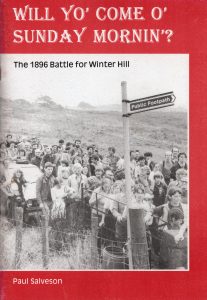 the first attempt by working class people to reclaim the countryside. Probably the UK’s biggest-ever rights of way struggle took place on the moors above Bolton in 1896, with three successive weekends of huge demonstrations to reclaim a blocked path. Over 12,000 took part in the biggest march. A new supply has been found and is available price £5 plus postage (free local delivery).
the first attempt by working class people to reclaim the countryside. Probably the UK’s biggest-ever rights of way struggle took place on the moors above Bolton in 1896, with three successive weekends of huge demonstrations to reclaim a blocked path. Over 12,000 took part in the biggest march. A new supply has been found and is available price £5 plus postage (free local delivery).
Ordering:
http://lancashireloominary.co.uk/index.html/order-form
Other titles still available:
Socialism with a Northern Accent (Lawrence and Wishart)
This was my take on a progressive Northern regionalism, with a foreword by the much-maligned but admirable guy, John Prescott. Time for a new edition – working on it
Railpolitik: bringing railways back to communities (Lawrence and Wishart)
This is an overview of railway politics from the early days to semi-monopolies and current arguments for nationalisation, or co-operative ownership?
109 Harpers Lane BOLTON BL1 6HU
Phone: 07795 008691 email: paul.salveson@myphone.coop
ORDER FORM 2021 (including Special Offers)
Name………………………………………………………………………………………………..
Delivery Address……………………………………………………………………………………………………………………..
…………………………………………………………………………………………………………Post code…………………….
Phone…………………………………………………………………………….email………………………………………………
| Quantity | Title | Price ( + delivery) |
| The Works (special offer) | 5.00 + £3 | |
| Allen Clarke/Teddy Ashton: Lancashire’s Romantic Radical (new edition, officially to be published September) pre-pub offer now: | 15.00 + £3 | |
| With Walt Whitman in Bolton (special offer) | 5.00 + £3 | |
| Moorlands, Memories and Reflections | 20.00 + £4 | |
| Will Yo’ Come O’ Sunday Mornin’? Winter Hill Trespass of 1896 | 5.00 + £3 | |
| The Settle-Carlisle Railway | 24.00 + £4 | |
| Total |
Bundles by negotiation! If ordering more than 1 book postage is £4 in UK. Local delivery is by Bolton Bicycling Bookshop, otherwise Royal Mail. Enquire for overseas rates.
Send cheque for total amount made to ‘Paul Salveson’ to 109 Harpers Lane, Bolton BL1 6HU.
If paying by BACS the account details are:
Dr P S Salveson (it’s a personal account) sort code 53-61-07 A/C no. 23448954. Email me with your order details and put your name and book e.g. ‘MMR’ or ‘Works’ as the reference when paying.
I’m happy to sign books, but please let me know (and to whom, if you want a specific dedication).
Many thanks for your support. Paul
